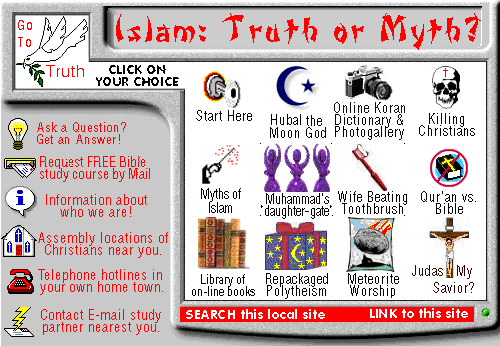Encyclopedia of Islam Myths:
The Islamic Myth that Muhammad was illiterate
 Muslims like to say, "how could a man who didn't know how to read or write produce the Koran?" Well first, Muhammad most certainly could read and write. The fact that he ran a major business proves he could. Unless he could read and write, he could not properly run his business affairs. Second, the Koran wasn't even written during the time of Muhammad, so even if he couldn't read or write, it is obvious he never saw the Koran, as Muslims have it today.
Muslims like to say, "how could a man who didn't know how to read or write produce the Koran?" Well first, Muhammad most certainly could read and write. The fact that he ran a major business proves he could. Unless he could read and write, he could not properly run his business affairs. Second, the Koran wasn't even written during the time of Muhammad, so even if he couldn't read or write, it is obvious he never saw the Koran, as Muslims have it today.
- Whatever Arabic tradition may have assumed from a wrong interpretation of a word in the Koran, it seems certain that Muhammad learned to read and write. But except for a few vague and unreliable pointers in his life and work we have no way of knowing the extent of his learning. (Mohammed, Maxime Rodinson, 1961, translated by Anne Carter, 1971, p 38-49)
- The Meccans were in general familiar with reading and writing. A certain amount of writing would be necessary for commercial purposes
. (Muhammad's Mecca, W. Montgomery Watt, Chapter 3: Religion In Pre-Islamic Arabia, p26-53)
- In view of this familiarity with writing among the Meccans particularly, both for records and for religious scriptures, there is a presumption that Muhammad knew at least enough to keep commercial records. (Muhammad's Mecca, W. Montgomery Watt, Chapter 3: Religion In Pre-Islamic Arabia, p26-53)
- The probability is that Muhammad was able to read and write sufficiently for business purposes
, but it seems certain that he had not read any scriptures. This conclusion gives Muslim scholars all that is essential for apologetic purposes. They have, however, argued that the word ummi which is applied to Muhammad implies complete inability to read and write. One of their arguments is that the plural ummiyyun in 2.78 means 'illiterate' or 'unlettered': 'among them are ummiyyun who do not know the book except from hearsay'. The rendering 'except from hearsay' (which is Pickthall's) is much disputed but hardly affects the argument. While kitab suggests writing as well as 'book', careful reading of the verse shows that the reference is to people without a written scripture, and Pickthall in fact translates kitdb as 'scripture'. This meaning suits the other instances where the plural occurs. In 3.75 some of the People of the Book say, 'We are not bound to justice in respect of the ummiyyun'; and from this it may be concluded that the word has been adopted from the People of the Book, that is, the Jews. The Jews, however, applied it to others and not to themselves, for in 3.20 Muhammad is commanded, 'Say to the People of the Book and the ummiyyun, Have you surrendered (to God)?' The ummiyynn, then, must be the non-Jews or Gentiles, who had no written scriptures and were in fact 'heathen' (as often translated); the word has presumably been derived from the Hebrew phrase ummot ha-'olan, the peoples of the world' or genies. This sense of ummi as 'Gentile' or 'unscriptured' fits the verses where it is applied to Muhammad: (God) it is who sent among the ummiyynn a messenger, (one) of themselves, to recite to them his signs, to purify them, and to teach them the Book and the wisdom, though before they were in clear error. (62.2) Again God is described as saying to Moses that his mercy will be 'written' for those 'who follow the. messenger, the ummi prophet, whom they find written in the Torah and the Evangel which they have . . .' (7.15 7). In the next verse Muhammad is commanded to address all the people and to conclude with the words: 'so believe in God, his messenger, the urnmi prophet, who believes in God and his words' (7.158 ). Thus the ummi' prophet is the non-Jewish or Gentile prophet, whom Muslims held to be foretold in the Bible, and who was sent by God to his own non-Jewish or heathen people, as well as to the Jews and perhaps the Christians. Thus ummi does not mean 'illiterate' in the strict sense, though it could be rendered 'unscriptured'; but this still means-as is indeed obvious-that Muhammad had no direct knowledge of the Bible. (Muhammad's Mecca, W. Montgomery Watt, Chapter 3: Religion In Pre-Islamic Arabia, p26-53)

Go To Start: WWW.BIBLE.CA

![]() Muslims like to say, "how could a man who didn't know how to read or write produce the Koran?" Well first, Muhammad most certainly could read and write. The fact that he ran a major business proves he could. Unless he could read and write, he could not properly run his business affairs. Second, the Koran wasn't even written during the time of Muhammad, so even if he couldn't read or write, it is obvious he never saw the Koran, as Muslims have it today.
Muslims like to say, "how could a man who didn't know how to read or write produce the Koran?" Well first, Muhammad most certainly could read and write. The fact that he ran a major business proves he could. Unless he could read and write, he could not properly run his business affairs. Second, the Koran wasn't even written during the time of Muhammad, so even if he couldn't read or write, it is obvious he never saw the Koran, as Muslims have it today.